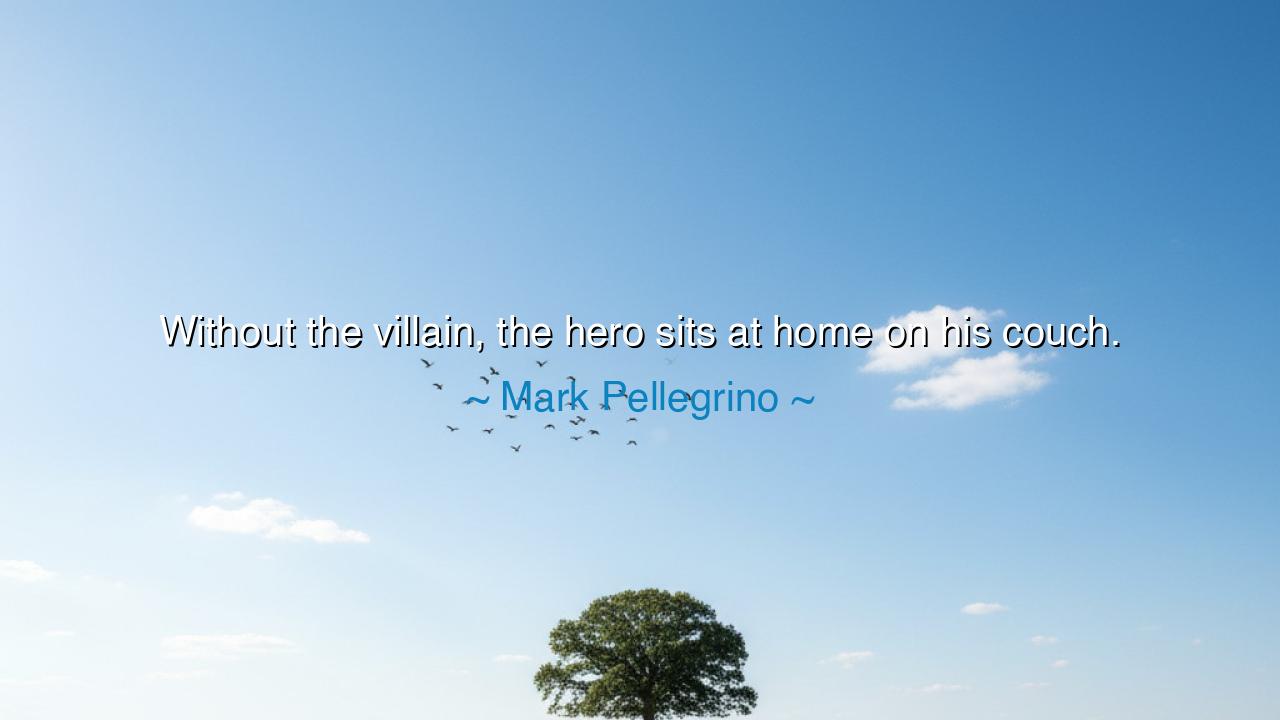
Without the villain, the hero sits at home on his couch.






In the flinty wisdom of Mark Pellegrino—“Without the villain, the hero sits at home on his couch”—we hear the old law of motion that governs every worthy tale and every ripened life. The sentence is spare as a spearshaft: it reminds us that courage is latent until a challenge knocks, that virtue is potential until conflict summons it into deed. Ease breeds slumber; resistance awakens sinew and sight. A world without opposition may be comfortable, but it is also a nursery where giants forget they are tall.
The ancients knew this as the grammar of myth. Hector makes Achilles; the Minotaur calls Theseus into a labyrinth where his name becomes a banner; Grendel drags Beowulf from feasting to fidelity. Strip the tale of its villain, and the plot collapses into furniture—the hero drowsing at home, his sword a mantel ornament. Adversary does not manufacture greatness; it reveals and refines it. Like iron to flint, the foe strikes a spark that shows the room we have been sitting in all along.
Yet the saying reaches past stories to the marrow of ordinary days. Our “villains” are not always cloaked in malice; often they arrive as conditions: illness, injustice, ignorance, entropy. Against such things the noble soul is measured. Comfort whispers, “Stay,” but meaning says, “Stand.” To stay on the couch is to consent to smaller horizons; to rise is to discover the breadth of one’s oath—to family, craft, neighbor, and truth.
Consider a page from history’s hard book. In 1955, the architecture of segregation sat like a dark citadel over American life. When Rosa Parks refused her seat, the city’s villain—a system, not a man—stepped into the open. In that exposure, a generation of heroes found their feet: ministers with tired shoes, students with bright eyes, elders with iron patience. The home became headquarters; the church, a training ground; the street, an altar. Without the provocation of that injustice, the courage was still present—but it might have slept longer, untested, unnamed.
Another witness: Winston Churchill in the gathering storm. For decades he wandered the political wilderness, warning of a threat many preferred not to see. When the villain finally showed his teeth, the talkative backbencher became the necessary captain. The moment married the man; the foe gave his voice its appointed register. It is not to praise the monster to admit this; it is to understand the paradox of moral physics: evil creates the occasion for public good to prove itself.
From this, take a lesson fit for any age: do not wish away all friction; wish for the strength to meet it cleanly. Seek trials proportionate to your soul, and when unwelcome trials arrive, treat them as summons, not sentences. Practical steps: (1) Name your present villain—a habit, a fear, a broken system—and write one brave action you can take this week. (2) Train while the room is quiet: study, drill, rest, and keep your tools in order so the knock at the door finds you ready. (3) Join companions; lone valor is brittle, but courage in company endures. (4) Measure success not by applause but by alignment—did you act in keeping with the truth you profess?
At last, let the saying be a watchword at your threshold: when comfort beckons you to the couch, ask which unchallenged good within you is dozing; when adversity arrives, greet it as the stern tutor of your better self. The hero is not forged by flattery, nor by idleness at home, but by choosing the road that a worthy villain makes unavoidable. Rise, then—without hatred, but with resolve. Let opposition be the whetstone, not the wound. And may your steps write a tale in which the darkness is answered, the sleeping good awakens, and the world learns, again, what a hero is for.






AAdministratorAdministrator
Welcome, honored guests. Please leave a comment, we will respond soon